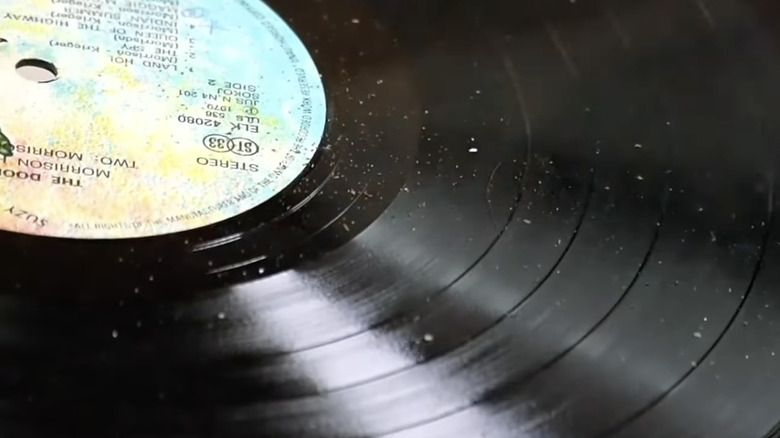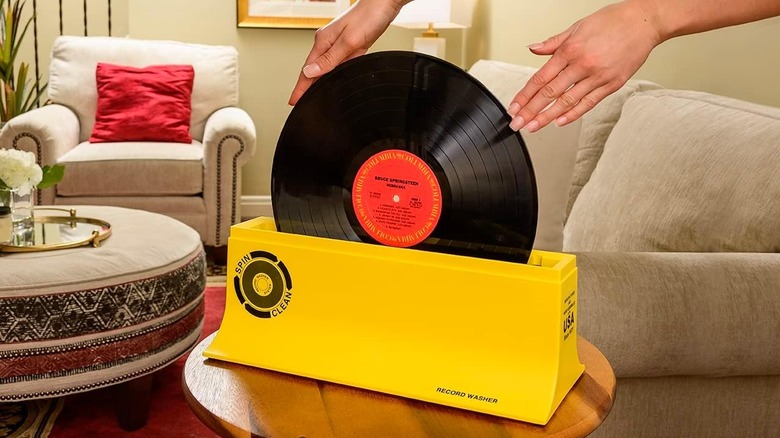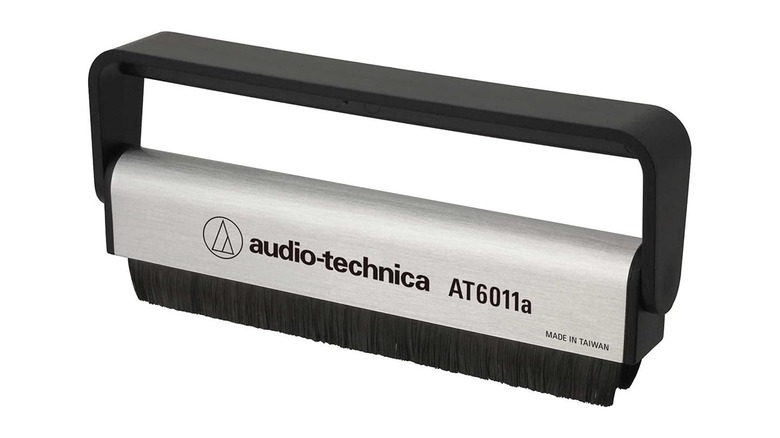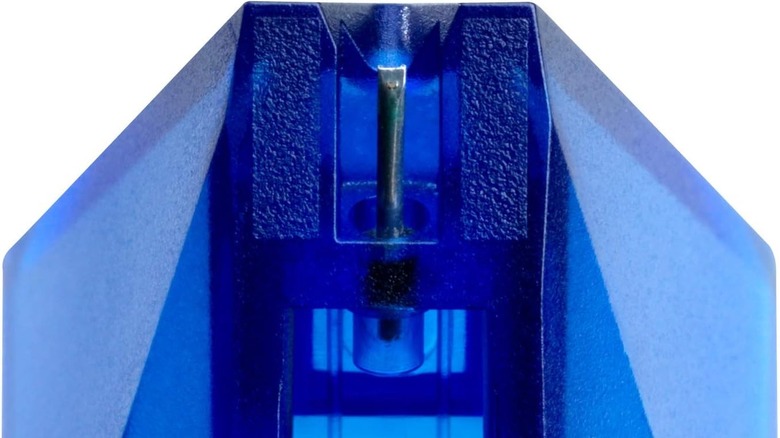How To Clean Vinyl Records Without Breaking The Bank
We may receive a commission on purchases made from links.
There are various reasons why vinyl records sell better than CDs these days, but the fact remains that with a good turntable, vinyl's often the best-sounding consumer format for recorded music — even more than 75 years after its introduction. However, vinyl is also a famously flawed format, as very minor damage can result in significant audible artifacts during playback, and these flaws are amplified by the kind of cheap turntables that a lot of people have used over the years.
However, if you treat vinyl well, it will return the favor. Still, it's an admittedly high-maintenance format that requires some TLC to shine as much as possible — and that includes cleaning your records. If you look at the record-cleaning sections of some of the most popular vinyl vendors, it's very easy to get sticker shock very quickly. Most of the record-cleaning devices you'll see are sophisticated, expensive products like ultrasonic and vacuum-based cleaners that are priced in the hundreds and thousands of dollars, well out of the reach of the average vinyl collector.
Thankfully, though, these aren't the only options for giving your records, a good, thorough cleaning that will help prevent playback issues that arise from the accumulation of dust, dirt, and other detritus. Speaking as a longtime vinyl enthusiast, let's take a look at some of the best ways to keep your records nice and clean without having to spend much money.
Why should I clean my records in the first place?
Serious cleaning isn't something you need to do to a record repeatedly, but it's an important part of record collecting. It's best to clean all records you get before you play them for the first time, including brand new ones. A record pressing plant, no matter how well-run, is not a clean room or sterile environment, so it's common for static and microscopic debris to accumulate on a record as it's being pressed and packed. Used records, meanwhile, can vary wildly depending on who's handled them and how. If you bought a used record from a vendor who cleans everything, you can hold off, but otherwise? Clean every single record as soon as you get it.
Cleanliness can affect the overall sound quality and the upkeep of the records, but it can also cause more acute, frustrating playback problems. Blemishes causing records to skip is one of the worst things about the format, but if you have a that skips and gets stuck without a visible issue like a deep scratch or a pressing defect, it could very well be an issue rectified by cleaning. I recently had this exact issue with my copy of the 2014 mono reissue of The Beatles' "Revolver," which was incredibly frustrating as it's out of print and replacing it could run $80 to $200. Before I could panic, I cleaned the record, and sure enough, it was as good as new.
Spin-Clean and its knockoffs are the best bang for your buck
For the best results you can get with the most minimal possible cash outlay, the best record-cleaning accessory is Spin-Clean and its various knock-offs. First released in 1974, the Spin-Clean is very simple — it's a plastic vat with brushes and rollers that you insert in the appropriate spots before filling it with distilled water and pouring cleaning fluid over the brushes. You insert the record, rotate it three times in both directions, remove it, let it dry, and you're set. It's much less expensive than vacuum or ultrasonic cleaners while out-cleaning other manual solutions, but as a plastic product that doesn't feel particularly expensive, it can seem steep at the $79.99 MSRP.
Thankfully, though, it's been knocked off and there are less expensive options with generally good reviews. The lowest-priced version is the $49.99 MSRP Studebaker, but that figure is a tad misleading because, per one customer review citing an email from the manufacturer, the included "cleaning solution" is just more distilled water.
The best deal is one I recently grabbed: Big Fudge's $61.95 MSRP Record Friend. Not only does it come with two small bottles of actual cleaning solution, but unlike even the original Spin-Clean, it includes a handy drying rack that's stored in the underside of the bath. One downside to the knockoffs is that their black plastic baths obscure how much dirt they remove, which isn't a problem for the yellow Spin-Clean.
Making an effort to reduce static buildup is also important
Even under the best of circumstances, records tend to accumulate static, which in turn attracts more dust. There are multiple ways to minimize this, some of which are in the cleaning realm. Using a carbon fiber brush on your records before playing them is probably the most common way to do this, as the brushes dissipate the static charge while also picking up dust and other debris. You can move the brush along the record manually or alternatively hold the brush to the record while giving it a few spins. Some collectors buy anti-static guns like the $125 MSRP Milty Zerostat 3, but that's probably overkill for most people.
Complicating matters is that a significant number of turntables on the market come with a felt slipmat to go between the records and the platter, and felt is a magnet for static. This can be alleviated by purchasing one of many varieties of inexpensive alternate slipmats; I personally switched to the $16.99 MSRP Pro Spin acrylic version recently and I've very happy with it, if just because my records aren't sticking to the mat anymore.
Another way to mitigate dust buildup is to store your records in anti-static inner sleeves as opposed to plain paper or cardstock liners, although many new records come this way by default. Whether you go with a rice paper sleeve, polypropylene, or poly-lined paper, your records will stay cleaner while stored in these sleeves.
Cleaning your turntable's stylus is also important
The goal of the cleaning process is not just to keep your records clean, but also to keep any detritus from accumulating on the stylus that reads the grooves to extract the music from the records into your turntable. Not only are you preventing damage to the stylus, but you also want to prevent debris from being transferred to other records.
There are various stylus cleaning options on the market, including brush and liquid-based kits, but by reputation, it seems like the best and easiest to use option has long been the $40 Onzow Zerodust, a pad of gel that you dip the stylus in and out of. The cost can be off-putting for such a tiny, simple thing, though, to say nothing of years past when it sold for $70.
Personally, having first explored buying the Zerodust in 2013 when it was $70, I found it unlikely that an obscure audiophile accessory harnessed a custom-developed compound, so I went Googling. I found a 2007 thread at the Audio Circle forum where it was discovered that dollar store "slapper hand" toys use the same material, bought one myself, and found it to work great. Since then, various companies have realized it was trivial to knock off the Zerodust and significantly undercut Onzow, with the $6 to $13 cleaner from KAIU being the best deal. Make sure to keep it out of heat and replace it every three years, though.




